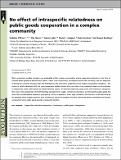Files in this item
No effect of intraspecific relatedness on public goods cooperation in a complex community
Item metadata
| dc.contributor.author | O'Brien, Siobhán | |
| dc.contributor.author | Hesse, Elze | |
| dc.contributor.author | Luján, Adela | |
| dc.contributor.author | Hodgson, David | |
| dc.contributor.author | Gardner, Andy | |
| dc.contributor.author | Buckling, Angus | |
| dc.date.accessioned | 2018-04-30T09:30:07Z | |
| dc.date.available | 2018-04-30T09:30:07Z | |
| dc.date.issued | 2018-04-29 | |
| dc.identifier | 252545032 | |
| dc.identifier | dadafb2e-eedb-474e-9a96-ce23a19bdfae | |
| dc.identifier | 85046014687 | |
| dc.identifier | 000431989400012 | |
| dc.identifier.citation | O'Brien , S , Hesse , E , Luján , A , Hodgson , D , Gardner , A & Buckling , A 2018 , ' No effect of intraspecific relatedness on public goods cooperation in a complex community ' , Evolution , vol. Early View . https://doi.org/10.1111/evo.13479 | en |
| dc.identifier.issn | 0014-3820 | |
| dc.identifier.uri | https://hdl.handle.net/10023/13259 | |
| dc.description | A.B. would like to acknowledge support from NERC (NE/P001130/1) and BBSRC (BB/K003240/1). S.O.B. was funded by a University of Exeter Ph.D studentship (2011–2015). A.G. is supported by a NERC Independent Research Fellowship (NE/K009524/1). | en |
| dc.description.abstract | Many organisms – notably microbes - are embedded within complex communities where cooperative behaviours in the form of excreted public goods can benefit other species. Under such circumstances, intraspecific interactions are likely to be less important in driving the evolution of cooperation. We first illustrate this idea with a simple theoretical model, showing that relatedness – the extent to which individuals with the same cooperative alleles interact with each other - has a reduced impact on the evolution of cooperation when public goods are shared between species. We test this empirically using strains of Pseudomonas aeruginosa that vary in their production of metal-chelating siderophores in copper contaminated compost (an interspecific public good). We show that non-siderophore producers grow poorly relative to producers under high relatedness, but this cost can be alleviated by the presence of the isogenic producer (low relatedness) and/or the compost microbial community. Hence, relatedness can become unimportant when public goods provide interspecific benefits. | |
| dc.format.extent | 9 | |
| dc.format.extent | 433547 | |
| dc.language.iso | eng | |
| dc.relation.ispartof | Evolution | en |
| dc.subject | Public goods | en |
| dc.subject | Siderophores | en |
| dc.subject | Cooperation | en |
| dc.subject | Psuedomonas | en |
| dc.subject | Microbial communities | en |
| dc.subject | QH426 Genetics | en |
| dc.subject | QR Microbiology | en |
| dc.subject | DAS | en |
| dc.subject.lcc | QH426 | en |
| dc.subject.lcc | QR | en |
| dc.title | No effect of intraspecific relatedness on public goods cooperation in a complex community | en |
| dc.type | Journal article | en |
| dc.contributor.sponsor | NERC | en |
| dc.contributor.institution | University of St Andrews. School of Biology | en |
| dc.contributor.institution | University of St Andrews. Centre for Biological Diversity | en |
| dc.identifier.doi | https://doi.org/10.1111/evo.13479 | |
| dc.description.status | Peer reviewed | en |
| dc.date.embargoedUntil | 2018-04-29 | |
| dc.identifier.grantnumber | NE/K009524/1 | en |
This item appears in the following Collection(s)
Items in the St Andrews Research Repository are protected by copyright, with all rights reserved, unless otherwise indicated.

